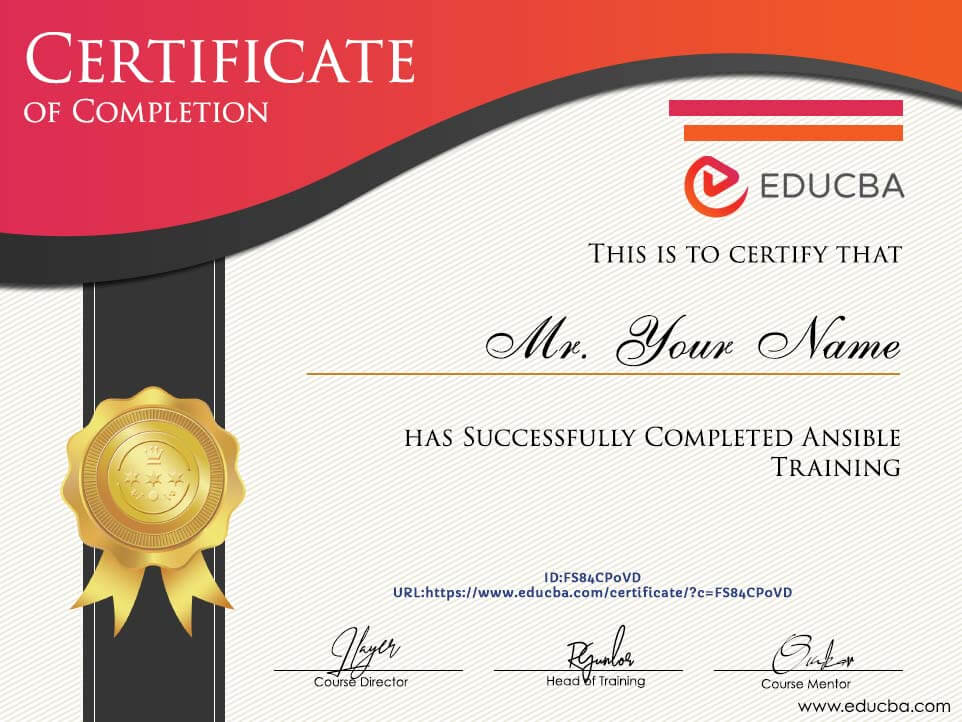ANSIBLE
Specialization | 4 Course Series
This Online Ansible Training includes 4 course with 11+ hours of video tutorials and One year access. In this course, you will learn about the basic concepts of Ansible and also learn how to create an Ansible playbook that demonstrates these concepts and connect them by configuring servers and handling deployments
MOST POPULAR
* One Time Payment & Get One year access
Offer ends in:
What you'll get
- 11+ Hours
- 4 Courses
- Course Completion Certificates
- One year access
- Self-paced Courses
- Technical Support
- Mobile App Access
- Case Studies
Synopsis
- Courses: You get access to all videos for a lifetime
- Hours: 11+ Video Hours
- Core Coverage: Learn the basic concepts of Ansible and also learn how to create an Ansible playbook
- Course Validity: One year access
- Eligibility: Anyone serious about learning Ansible
- Pre-Requisites: Basic knowledge about Linux administration
- What do you get? Certificate of Completion for the course
- Certification Type: Course Completion Certificates
- Verifiable Certificates? Yes, you get verifiable certificates for each 4 course, and project with a unique link. These link can be included in your resume or LinkedIn profile to showcase your enhanced skills
- Type of Training: Video Course – Self Paced Learning
Content
-
MODULE 1: Learning ANSIBLE from Practicals & Projects
Courses No. of Hours Certificates Details Project on Ansible - Scalable Environment for a Startup 3h 13m ✔ Project on Ansible - Automating Software Deployment Process 2h 51m ✔ -
MODULE 2: Ansible Essentials Training
Courses No. of Hours Certificates Details Ansible - Beginners to Beyond 3h 7m ✔ Project on Ansible - Automatic Deployment of Magento 2 47m ✔
Description
- In this, you will learn how to write ansible configuration playbooks to check cluster status and perform cluster restart.
- In this, you will learn some ad-hoc commands which are used against servers using ansible.
- In this course, you will learn skills that will be helpful for testing and troubleshooting the ansible playbooks’ execution.
- In this Ansible course, you will learn how to write simple plays and tasks, also write code from data using Jinja 2 templates and variables.
- In this course, you will also learn the essentials of configuration and deployment using Ansible automation tool.
Sample Certificate

Requirements
- There are no many requirements to undergo this training. To undergo this course you should have (not mandatory) knowledge on the Linux system to set up Ansible.
- To undergo this course you should have some basic knowledge of Linux administrator skills. Other than this it is all covered under this Ansible course.
- It is better to have access to Linux systems before you undergo this training.
Target Audience
- Any IT professionals who are having a basic knowledge of Ansible and are keen to explore more in this technology can undergo this training.
- DevOps engineers also can undergo this training as Ansible training provides automation for infrastructure which adds the benefit of versioning and scaling when it comes to infrastructure automation with Ansible tool.
- This Ansible course can also be taken by Linux system administrators, developers and release engineers as they can explore more in this technology and become expert in this automation and managing the cloud, configuring network devices, etc.
* One Time Payment & Get One year access
Offer ends in:
Training 5 or more people?
Get your team access to 5,000+ top courses, learning paths, mock tests anytime, anywhere.
Drop an email at: [email protected]
